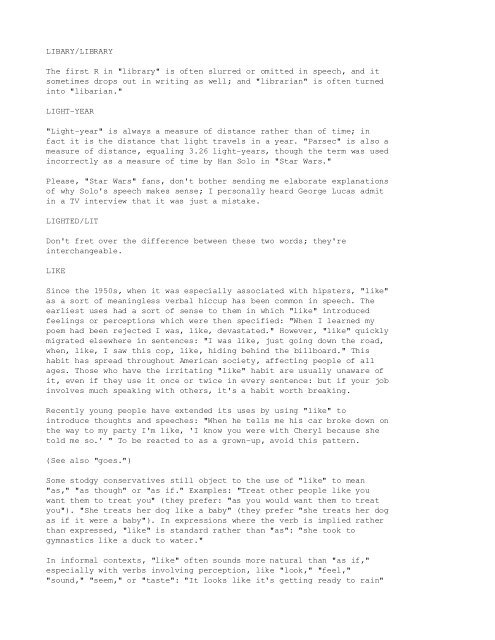Common_Errors_in_English_usage
Common_Errors_in_English_usage
Common_Errors_in_English_usage
You also want an ePaper? Increase the reach of your titles
YUMPU automatically turns print PDFs into web optimized ePapers that Google loves.
LIBARY/LIBRARY<br />
The first R <strong>in</strong> "library" is often slurred or omitted <strong>in</strong> speech, and it<br />
sometimes drops out <strong>in</strong> writ<strong>in</strong>g as well; and "librarian" is often turned<br />
<strong>in</strong>to "libarian."<br />
LIGHTYEAR<br />
"Lightyear" is always a measure of distance rather than of time; <strong>in</strong><br />
fact it is the distance that light travels <strong>in</strong> a year. "Parsec" is also a<br />
measure of distance, equal<strong>in</strong>g 3.26 lightyears, though the term was used<br />
<strong>in</strong>correctly as a measure of time by Han Solo <strong>in</strong> "Star Wars."<br />
Please, "Star Wars" fans, don't bother send<strong>in</strong>g me elaborate explanations<br />
of why Solo's speech makes sense; I personally heard George Lucas admit<br />
<strong>in</strong> a TV <strong>in</strong>terview that it was just a mistake.<br />
LIGHTED/LIT<br />
Don't fret over the difference between these two words; they're<br />
<strong>in</strong>terchangeable.<br />
LIKE<br />
S<strong>in</strong>ce the 1950s, when it was especially associated with hipsters, "like"<br />
as a sort of mean<strong>in</strong>gless verbal hiccup has been common <strong>in</strong> speech. The<br />
earliest uses had a sort of sense to them <strong>in</strong> which "like" <strong>in</strong>troduced<br />
feel<strong>in</strong>gs or perceptions which were then specified: "When I learned my<br />
poem had been rejected I was, like, devastated." However, "like" quickly<br />
migrated elsewhere <strong>in</strong> sentences: "I was like, just go<strong>in</strong>g down the road,<br />
when, like, I saw this cop, like, hid<strong>in</strong>g beh<strong>in</strong>d the billboard." This<br />
habit has spread throughout American society, affect<strong>in</strong>g people of all<br />
ages. Those who have the irritat<strong>in</strong>g "like" habit are usually unaware of<br />
it, even if they use it once or twice <strong>in</strong> every sentence: but if your job<br />
<strong>in</strong>volves much speak<strong>in</strong>g with others, it's a habit worth break<strong>in</strong>g.<br />
Recently young people have extended its uses by us<strong>in</strong>g "like" to<br />
<strong>in</strong>troduce thoughts and speeches: "When he tells me his car broke down on<br />
the way to my party I'm like, 'I know you were with Cheryl because she<br />
told me so.' " To be reacted to as a grownup, avoid this pattern.<br />
(See also "goes.")<br />
Some stodgy conservatives still object to the use of "like" to mean<br />
"as," "as though" or "as if." Examples: "Treat other people like you<br />
want them to treat you" (they prefer: "as you would want them to treat<br />
you"). "She treats her dog like a baby" (they prefer "she treats her dog<br />
as if it were a baby"). In expressions where the verb is implied rather<br />
than expressed, "like" is standard rather than "as": "she took to<br />
gymnastics like a duck to water."<br />
In <strong>in</strong>formal contexts, "like" often sounds more natural than "as if,"<br />
especially with verbs <strong>in</strong>volv<strong>in</strong>g perception, like "look," "feel,"<br />
"sound," "seem," or "taste": "It looks like it's gett<strong>in</strong>g ready to ra<strong>in</strong>"





